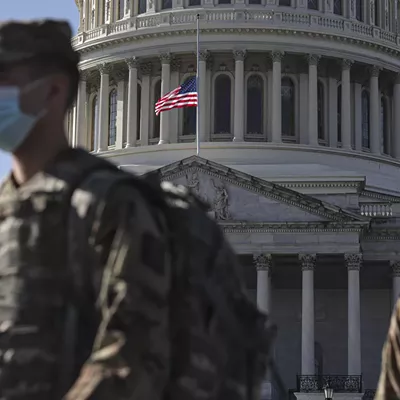
When we do wrong, it's usually not evil. We have ethical guardrails of conscience that prevent us from careening into darkness. We may pilfer office supplies from work, lie to our child about our past drug use or cop an unexpected Jackson from the ATM, but these ethical lapses are not evil.
We can rationalize these minor transgressions, yet our conscience corrects our course. On the other hand, if we causally normalize these moral misdemeanors, in times of duress what other ethical precepts of more consequence might we compromise?
We know from history and psychology that under pernicious conditions, our ethics are malleable and we may be impelled to act in ways that otherwise we would regard as unimaginably repellent, perhaps even evil. Evil is some belief or action that by ethical norms is morally reprehensible and does extreme harm to others; "ethical norms," however, can be distorted to justify and even sanctify evil. Perhaps the Jan. 6 insurrectionists were outliers, aberrations of the body politic, yet many of us are capable of condoning if not engaging in comparable actions.
Before evil, there is hate. In Faces of the Enemy (1986), psychologist Sam Keen demonstrates how ordinary individuals could be incited to hate and harm those regarded as enemies:
First, the individual is affected by some adverse change in his status — economic, political, cultural — that he is impotent to remedy. Angry and searching to assign blame, this individual is susceptible to irrational suggestion.
Second, oft-repeated lies propagate fears that an insular, conspiratorial group controls and subverts institutions causing his insecurity.
Third, these others are stereotyped and depicted as evil; religion is often misappropriated to consecrate incipient hatred and opposition, even violence, framed as a righteous moral imperative. Thus evil mutates into an ethical good — even a sacred duty.
Finally, these others are dehumanized. This perverse thinking enabled the Nazis to depict Jews as rats to be exterminated (see the Nazi film "Eternal Jew" on YouTube), and Trump to describe immigrants and a Black Manhattan district attorney as "animals."
This is the Jekyll to Hyde psychology, which boils the blood and drives the drums of war transforming otherwise apathetic citizens into combatants. Normally a moral verboten, violence against others is thus legitimized, even necessitated by a perceived existential exigency. Some Germans witnessing early Nazi laws discriminating against Jews rationalized such as "necessary evils," but most, like theologian Martin Niemöller, did nothing. Incrementally these "necessary evils" were promulgated as sufficiently necessary to the point that worse policies (i.e., the Holocaust) were believed to be no longer evil, but necessary, perhaps even good. That said, Dietrich Bonhoeffer, White Rose, and innumerable Jews courageously resisted Nazi evil and perished horrifically for their moral fortitude.
The way this hate manifests and metastasizes is when individuals with the same fears and grievances coalesce in a group. If these individuals feel abandoned by society, they are accepted by those similarly aggrieved. If there is individual residual aversion to violence — a cognitive dissonance — such is assuaged and rationalized through groupthink. Thus individuals subsume their conscience to the collective, be it of the political right or left. Human nature transcends ideology. It happened not only in Nazi Germany but in Stalin's Soviet Union, and today it's happening here and in Putin's Russia. Recall the boys in Lord of the Flies (1954) who mutate from playfully normal to ferociously savage.
This process of moral inversion and rationalized violence targeting these despised "others" who allegedly connive to emasculate the alienated are often tolerated if not sanctioned by a charismatic authority (see Timothy Egan's new book A Fever in the Heartland about the KKK in 1920s America).
Would the 2017 Charlottesville "Unite the Right" marchers howling anti-Semitic and racist screeds have been as toxic had Trump not polluted our politics with similar invectives? Or would Jan. 6 have been as barbaric had he not incited the mob? Or would the QAnon virus have infected a quarter of Republicans if Trump had not transmitted paranoid, conspiratorial rants?
If we think that our moral rectitude can resist such authoritarian entreaties to violence, consider Yale psychologist Stanley Milgram's 1963 experiment determining how individuals are willing to obey evil dictates. In the experiment, men with diverse levels of education and occupations were instructed by an authority figure — a clinical psychologist — to perform acts that conflicted with their personal ethics.
Participants were told to administer electric shocks to an unseen "learner" in another room, ostensibly to assist the shocked subject's learning. Participants did not know that there was no electricity, rather they believed the shocks were real. Milgram found that all participants were willing to fully obey the instructions to administer 300 volts with 65% delivering up to a potentially lethal 450 volts even as actors' faux reactions increased from moans to screams. Cruelty lurks in our instincts.
Thus the Nazis at Nuremberg and the Bosnian Serb and Hutu soldiers in the 1990s would defend their atrocities as simply complying with the orders of an authority.
All such acts of mass violence were impossible without average civilians, like Turks becoming willing executioners against Armenians in 1915-17 and Cambodians against their own in the 1970s killing fields. And those who are silent are complicit to these evils. Hannah Arendt refers to this as "the banality of evil" (see her "Eichmann in Jerusalem"). If we were in their place, would we have the moral resolve to resist?
Usually we are decent and impervious to evil, yet our history and nature should caution that our better angels are fragile. ♦
John Hagney is a retired history teacher, spending 45 years at Lewis and Clark High School. He was named a U.S. Presidential Scholar Distinguished Teacher and published an oral history of Mikhail Gorbachev's reforms that has been translated into six languages.























